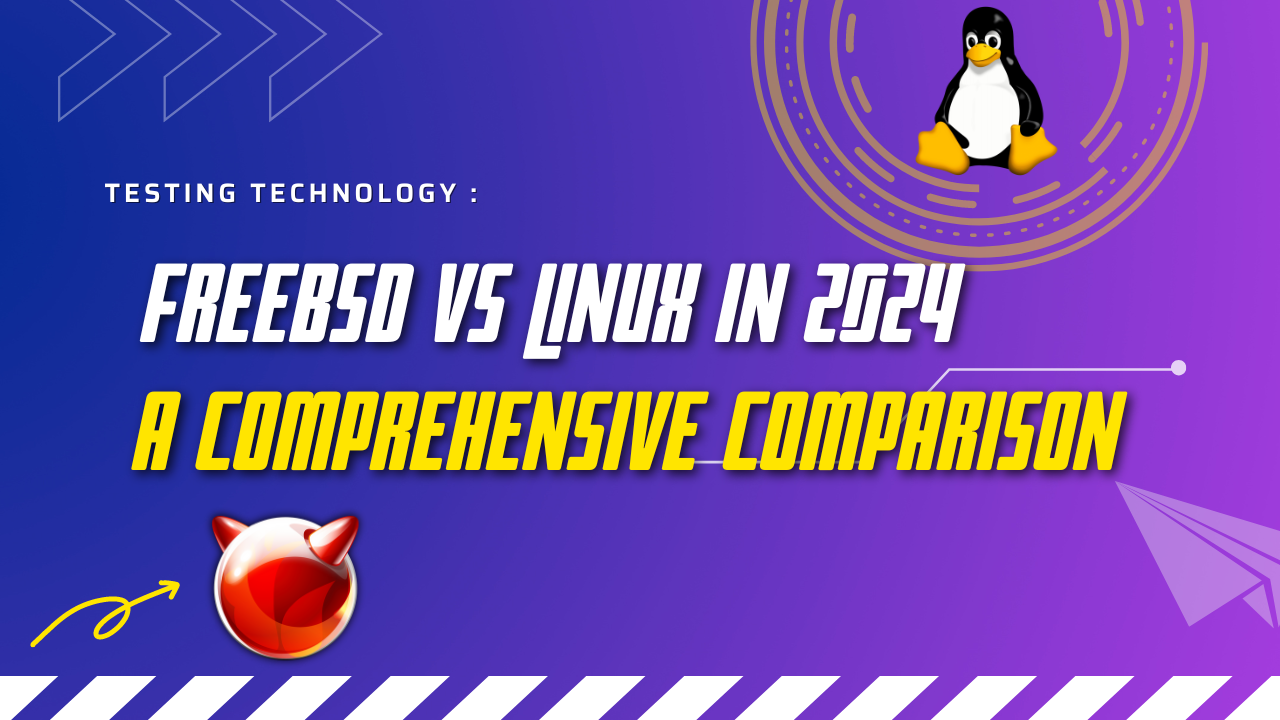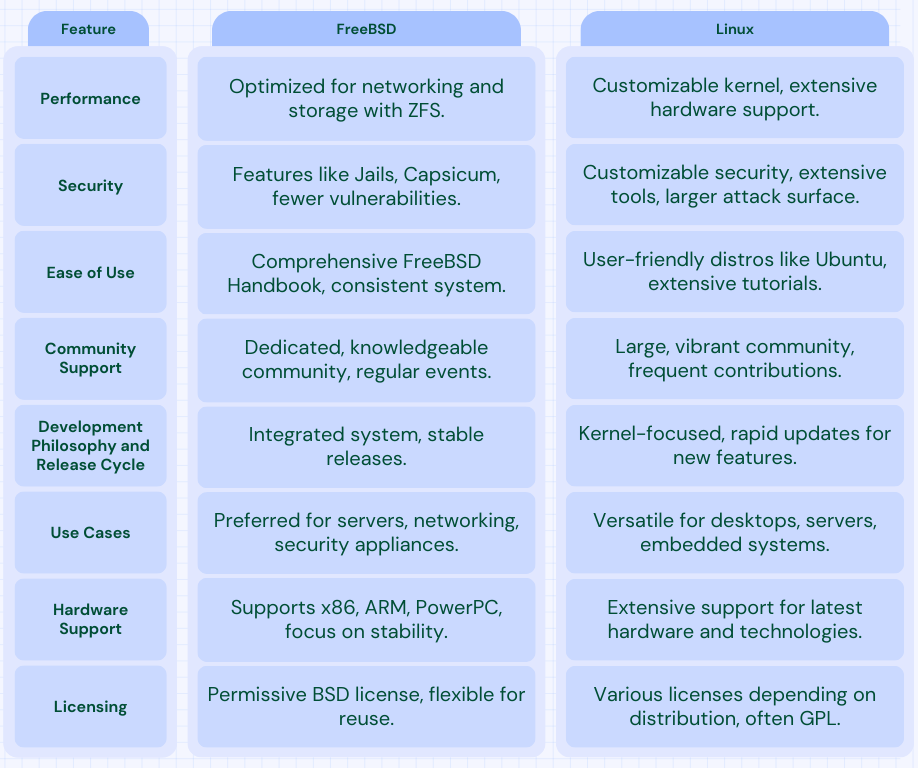FreeBSD vs Linux in 2024: A Comprehensive Comparison

The world of operating systems is dynamic and constantly evolving. Two significant players in this realm are FreeBSD and Linux. Both have long histories and loyal followings, yet they cater to different needs and environments. This extensive guide delves into a detailed comparison between FreeBSD and Linux as of 2024, examining various aspects such as performance, security, ease of use, community support, development philosophy, and use cases to help you decide which operating system best fits your requirements.

Overview of FreeBSD and Linux
FreeBSD
FreeBSD is a free and open-source Unix-like operating system derived from the Berkeley Software Distribution (BSD). Known for its advanced networking, security features, and the powerful ZFS file system, FreeBSD is widely used in server environments due to its robustness and high performance. It is also the foundation for several well-known projects, including FreeNAS (now TrueNAS), pfSense, and the PlayStation 4 operating system.
Linux
Linux, strictly speaking, refers to the kernel that is the core component of the operating system. However, in common usage, it refers to the complete system built around the Linux kernel, which includes a wide range of distributions (distros) such as Ubuntu, Fedora, CentOS, and many others. Linux is celebrated for its flexibility, extensive hardware support, and vibrant community. It is used in various environments, from desktops to servers and embedded systems.
Performance Comparison
FreeBSD Performance
FreeBSD is renowned for its high performance, particularly in networking and storage applications. Several features contribute to its performance prowess:
- Advanced Networking: FreeBSD's networking stack is highly optimized, making it a preferred choice for network appliances and high-traffic web servers. It supports a range of networking features, including network address translation (NAT), traffic shaping, and advanced routing capabilities.
- ZFS File System: FreeBSD's native support for the ZFS file system is a significant advantage. ZFS provides features such as data integrity, compression, snapshots, and cloning, making it an ideal choice for storage solutions.
- System Efficiency: FreeBSD's kernel and userland are developed together, ensuring a cohesive and efficient system.
Linux Performance
Linux offers robust performance capabilities, driven by its modular design and broad hardware support. Key aspects include:
- Flexibility and Customization: The Linux kernel is highly customizable, allowing for extensive optimization to suit various performance needs. Different distributions cater to different performance requirements, from lightweight systems to high-performance servers.
- Hardware Compatibility: Linux supports a vast array of hardware platforms, making it suitable for diverse environments from desktop computers to supercomputers.
- Advanced File Systems: Linux supports several advanced file systems like ext4, Btrfs, and XFS, each offering unique performance characteristics and features.
Security Features
FreeBSD Security
Security is a core focus for FreeBSD, with several built-in features that enhance its security posture:
- Jails: FreeBSD's jail mechanism provides lightweight virtualization, allowing administrators to isolate applications and services securely.
- Capsicum: This capability-based security framework offers fine-grained access control, enabling the development of secure applications.
- Audit Framework: FreeBSD includes a robust auditing framework that provides detailed logging of system events, useful for security audits and compliance.
Linux Security
Linux also places a strong emphasis on security, supported by a vast array of tools and frameworks:
- Security Modules: Linux supports various security modules like SELinux (Security-Enhanced Linux), AppArmor, and Seccomp, providing mandatory access controls and other security enhancements.
- User Namespace: Linux namespaces, including user namespaces, allow for the isolation of processes, enhancing security.
- Large Community and Frequent Patching: The extensive Linux community and frequent security updates ensure that vulnerabilities are quickly addressed.
Ease of Use
FreeBSD Usability
FreeBSD is designed to be versatile and user-friendly, with a focus on comprehensive documentation and consistency:
- FreeBSD Handbook: The FreeBSD Handbook is an extensive resource that covers installation, configuration, and system administration in great detail.
- Ports Collection and
pkg: The Ports Collection provides a straightforward way to install and manage third-party software. Thepkgbinary package manager simplifies software installation and management. - System Consistency: FreeBSD is developed as a complete operating system, ensuring a high level of consistency and stability across all its components.
Linux Usability
Linux is celebrated for its flexibility and user-friendly distributions:
- User-Friendly Distributions: Distributions like Ubuntu, Mint, and Fedora offer user-friendly interfaces and extensive support, making them accessible to users of all skill levels.
- Extensive Community Resources: The large and active Linux community provides numerous tutorials, forums, and documentation, helping users troubleshoot and learn.
- Customization: Linux's modular nature allows users to tailor the system to their specific needs, from lightweight desktop environments to fully-featured server setups.
Community Support
FreeBSD Community
FreeBSD has a dedicated and knowledgeable community, providing extensive support and resources:
- Mailing Lists and Forums: FreeBSD has numerous mailing lists and forums for different aspects of its development and usage, offering a wealth of information and support.
- IRC Channels: Real-time support and discussion are available on various IRC channels.
- Conferences and Events: FreeBSD conferences and events, such as AsiaBSDCon and EuroBSDCon, provide opportunities for users and developers to collaborate and learn.
Linux Community
The Linux community is one of the largest and most vibrant in the open-source world:
- Online Forums and Mailing Lists: Numerous forums and mailing lists are available for support and discussion, covering virtually every aspect of Linux.
- IRC and Chat Platforms: Real-time support is available through IRC and chat platforms like Discord and Slack.
- Frequent Contributions and Innovations: The extensive developer base continually contributes to the Linux kernel and distributions, driving constant improvements and innovations.
Development Philosophy and Release Cycle
FreeBSD Development
FreeBSD follows a development philosophy that balances innovation with stability:
- Integrated Development: FreeBSD is developed as a complete operating system, not just a kernel, ensuring a cohesive and consistent user experience.
- Stable Releases: FreeBSD has regular updates with a focus on long-term stability, making it a reliable choice for production environments.
Linux Development
Linux development is characterized by rapid innovation and a diverse ecosystem of distributions:
- Kernel-Centric Development: The core Linux kernel is developed by Linus Torvalds and a large team of contributors, with various distributions building their systems around this kernel.
- Frequent Updates: Linux distributions often have rapid release cycles, allowing users to access the latest features and technologies quickly.
Use Cases and Real-World Applications
FreeBSD Use Cases
FreeBSD is widely used in various applications due to its performance and security features:
- Servers: FreeBSD is a preferred choice for web hosting, networking, and storage solutions, thanks to its stability and advanced networking capabilities.
- Security Appliances: FreeBSD's security features make it ideal for firewalls, intrusion detection systems, and other security appliances.
- Network Appliances: Companies like Netflix and Yahoo! utilize FreeBSD for its robust networking stack.
Linux Use Cases
Linux's versatility makes it suitable for a wide range of applications:
- Desktops: User-friendly distributions like Ubuntu and Mint make Linux a popular choice for desktop use.
- Servers: Linux is widely used in server environments, from small businesses to large enterprises, due to its flexibility and extensive software support.
- Embedded Systems: Linux's modularity and lightweight distributions make it ideal for embedded systems and IoT devices.
- Cloud Infrastructure: Linux dominates the cloud computing space, powering many of the world's largest cloud service providers.
Hardware Support
FreeBSD Hardware Support
FreeBSD supports a wide range of hardware platforms, ensuring compatibility with various systems:
- Broad Compatibility: FreeBSD supports x86, ARM, PowerPC, and more, making it suitable for both high-end servers and embedded devices.
- Performance Optimization: The FreeBSD development team focuses on optimizing performance for supported hardware.
Linux Hardware Support
Linux offers extensive hardware support, catering to diverse environments:
- Cutting-Edge Hardware: Linux supports the latest hardware technologies, making it suitable for a wide range of devices.
- Wide Range of Platforms: Linux runs on everything from desktops and laptops to servers, supercomputers, and embedded systems.
Licensing
FreeBSD Licensing
FreeBSD uses the permissive BSD license, which offers flexibility for reuse and modification:
- Permissive License: The BSD license allows for extensive reuse and modification of the code, making it attractive to companies and projects that want to incorporate FreeBSD code into their products without the restrictions of copyleft licenses.
Linux Licensing
Linux uses various licenses depending on the distribution, often including the GNU General Public License (GPL):
- GPL License: The GPL requires that derivative works be released under the same license, promoting the sharing and improvement of code.
- Diverse Licensing: Different Linux distributions may use different licenses for various components, providing a mix of permissive and copyleft licenses.
Conclusion
Both FreeBSD and Linux are powerful operating systems with their own unique strengths and focuses. FreeBSD excels in performance, security, and consistency, making it a great choice for server environments and security-focused applications. On the other hand, Linux offers unparalleled flexibility, extensive hardware support, and a vibrant community, making it suitable for a wide range of applications.
Ultimately, the choice between FreeBSD and Linux depends on your specific requirements and priorities. By understanding the differences and strengths of each system, you can make an informed decision that best suits your needs.
Follow me on:
X: @maxiujun
Threads.net @xiujunma
BlueSky: @maxiujun.bsky.social
Read Next
Exciting Changes in FreeBSD: Streamlined Releases and Enhanced Support
FreeBSD, known for its robust and reliable open-source operating system, is undergoing significant changes aimed at improving its release process and support structure. These updates promise to enhance user experience,
Unleashing AI Power: Installing and Running LLaMA 3.1 Locally with Ollama
Meta has unveiled significant advancements in natural language processing, introducing upgraded versions of their 8B and 70B models, alongside a new model with 405B parameters. The 405B parameter model notably

